Aujourd’hui, nous allons nous intéresser au Quotient Intellectuel – le fameux QI – car il a un rôle central chez le haut potentiel intellectuel. Il s’agit en gros du résultat d’un test psychométrique qui permettrait de fournir une indication sur l’intelligence de l’individu testé.
Avant de commencer, je me permets de préciser deux points que je trouve importants. Le premier, c’est que vous allez vous rendre assez rapidement compte que le QI – du moins son résultat – n’est pas totalement fiable. En réalité, on estime que le score obtenu n’est représentatif qu’à environ 70% de notre « intelligence réelle ». Ainsi, il est possible de passer plusieurs fois le même test et d’obtenir des résultats différents. C’est ce qui fait que je ne voue pas un culte fou au quotient intellectuel. Ensuite, mon second point, est que je vais malgré tout parler de résultats à ce test. Or, il est possible de mal interpréter un mauvais score. Certaines personnes se permettent de classer les Hommes selon leur intelligence, et les résultats des tests de QI ont d’ailleurs été la source de quelques théories racistes. Ce n’est ici pas le cas. Encore une fois, je ne suis pas convaincu par la valeur du résultat, donc je ne vais pas fonder et/ou soutenir une théorie basée dessus.
Aussi, vous verrez que j’ai inclus des parties grisées sur cette page. Elles correspondent à une sorte de FAQ autour du quotient intellectuel, et permettent éventuellement à un(e) lecteur(trice) pressé(e) de ne choper que quelques points clefs. Bonne lecture.
Que signifie QI ?
QI signifie Quotient Intellectuel. C’est l’unité de mesure de l’intelligence. Il résulte de tests psychométriques. Attention, il s’agit bien d’un quotient intellectuel et non pas d’un coefficient intellectuel.
Définition du QI
Comme énoncé plus haut, le quotient intellectuel sert à mesurer l’intelligence humaine, que l’on mesure elle-même via le Facteur Général, ou Facteur g.
C’est quoi le Facteur g ?
Je ne vais pas rentrer dans les détails car c’est long et compliqué (on y reviendra peut-être une prochaine fois ceci dit). Ce qu’il faut retenir, c’est qu’en 1904 un psychologue nommé Charles Spearman a proposé l’idée que toutes les performances mentales d’une personne peuvent être conceptualisées en un seul facteur d’habileté générale : le Facteur g. C’est un peu comme la puissance d’un ordinateur si vous voulez. Plus l’ordinateur est puissant, plus son Facteur g sera élevé. Les tests de Quotient Intellectuel permettent donc de mesurer ce Facteur g.
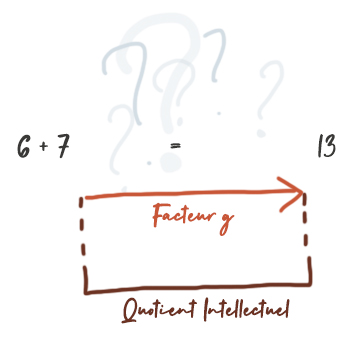
NB : j’espère que vous avez remarqué que le Facteur g s’écrit avec un petit « g » en italique, à ne pas confondre avec le Point G qui, lui, bénéficie d’un grand « g ». Deux salles, deux ambiances.
Les différents calculs du QI
On estime qu’il y a deux façons de calculer le Quotient Intellectuel : le QI classique, et le QI standard.
QI classique, ou l’âge mental
La première façon, et également la plus ancienne, de calculer le QI est la méthode appelée du QI classique, ou de l’âge mental. Par exemple, un enfant de 10 ans qui présente les aptitudes cognitives d’un enfant de 15 ans aura « 15 ans d’âge mental ». Pour définir cela, on lui présente plusieurs items. Les items d’un enfant de 10, 11, 12, 13, 14 puis 15 ans. Ceux de 15 ans doivent être échoués par presque tous les enfants de 14 ans, réussi par 50% des enfants de 15 ans, et réussi par la quasi-totalité des enfants de 16 ans. Simple, non ? Et pour calculer ce QI, on utilise la formule suivante :
(âge mental / âge réel) * 100 = Quotient Intellectuel
Ainsi, si nous reprenons l’exemple ci-dessus, on peut en déduire que l’enfant aura un QI classique de (15/10)*100 = 150. L’idée est facile à comprendre je trouve. Par contre, elle ne s’applique qu’aux enfants car il va être plus compliqué de différencier l’âge mental d’un adulte de 50 ans par rapport à celui de 55 ans.
QI par rang, devenu le QI standard
La deuxième façon de calculer le Quotient Intellectuel est le QI par rang. Cette méthode est devenue bien plus utilisée (notamment car elle fonctionne aussi sur les adultes), et on l’appelle donc QI standard. Sur ce site, lorsque je parle de QI (seul, sans rien), je fais allusion à cette méthode et non pas à l’âge mental. Ici, le quotient intellectuel est représenté avec la loi normale (aka la courbe de Gauss, aka la courbe normale). L’étalonnage fixe (du fait de sa construction) le QI moyen au milieu de la bosse. On utilise généralement l’écart-type de 15, et le quotient intellectuel moyen à 100.
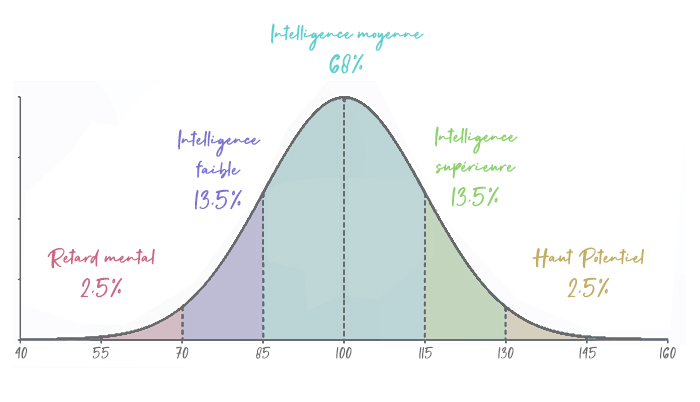
Comprenez bien qu’il s’agit là d’une mesure historique et complètement arbitraire, car on estime (oui oui, une estimation) que la distribution du QI dans le monde est normale. Ainsi, avec un écart-type (arbitraire) de 15 et une moyenne (arbitraire également) à 100, la courbe de Gauss implique que :
- 68% de la population est située à un écart-type de la moyenne, donc entre 85 et 115 (100 plus ou moins 15) ;
- 95% de la population est située à deux écart-types de la moyenne, donc entre 70 et 130 (100 plus ou moins 15 * 2).
Comment calculer le QI ?
Le QI se calcule de deux façons : soit par âge mental (on dit que vous avez l’âge mental de quelqu’un de XX années), soit par rang (l’échelle globale est basée sur la courbe de Gauss). Il existe plusieurs échelles pour calculer le QI par rang (comme on le fait aujourd’hui). Dans tous les cas, le calcul du QI se fait avec un psychologue.
Le QI est-il inné ou acquis ?
On ne sait pas trop. Le QI semble majoritairement inné. Néanmoins, divers facteurs (biologiques, génétiques et environnementaux) peuvent l’influencer. Aujourd’hui, il n’existe pas assez d’études et de preuves scientifiques pour pouvoir donner une réponse ferme et définitive.
Le QI a-t’il une forme de courbe ?
On ne sait pas. La forme de courbe (la courbe normale de Gauss) est la représentation actuelle que l’on s’en fait car on part du principe que les quotients intellectuels sont distribués de façon normale parmi tous les êtres humains. Cependant, aucune preuve n’existe pour le justifier.
Effet de tassement
Les QI classiques et standards (sur l’échelle de Wechsler) sont relativement similaires pour les scores médians. Par exemple, un enfant avec un QI de 110 sur l’échelle de Wechsler (donc un QI standard) sera proche d’un QI en âge mental de 110. C’est une autre histoire lorsque les QI augmentent. Ainsi, une fillette de 6 ans avec un QI standard de 149 aura un QI en âge mental de… 179 ! C’est pourquoi on dit que le QI standard présente un effet de tassement sur les hauts QI. Au fur et à mesure que le QI augmente, le résultat sera plus bas que sur un QI en âge mental. Il se tasse.
C’est notamment afin de limiter cet effet que Cattell a mis au point un QI standard avec un écart-type de 24 (et non 15 comme Wechsler).
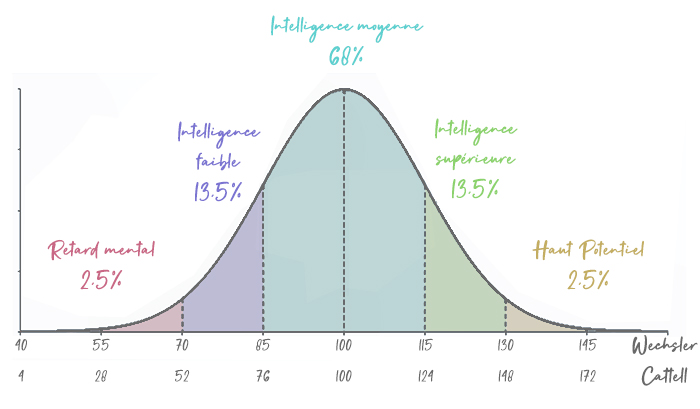
Petite histoire
Le QI est donc une mesure arbitraire qui permet de tenter de mesurer l’intelligence humaine. Mais du coup, comment en est-on arrivé là ? Pour ça, je vous propose une petite page historique autour de la création de ce Quotient Intellectuel.
Les travaux autour de l’intelligence humaine commencent à la fin du 19ème siècle. L’Anglais Sir Francis Galton (un cousin de Darwin !) est persuadé que l’intelligence humaine est en majeure partie héréditaire. Il cherche donc un moyen de la mesurer pour… améliorer l’espèce humaine. Bonne ambiance. C’est d’ailleurs lui qui présente au monde l’idée d’eugénisme (sélection des individus de manière génétique pour éliminer ceux qui n’entrent pas dans un cadre prédéfini). Vraiment glauque. Heureusement, il n’est jamais parvenu à trouver une méthode efficace de calcul.
En 1890, l’Américain McKeen Cattell commence à évoquer l’idée d’âge mental. Mais ce n’est qu’en 1905 que deux français – Alfred Binet et Théodore Simon – mettent au point le premier test utilisable : le test de Binet et Simon. Ils le font à la demande de l’État (dans le but d’identifier les élèves en difficultés scolaires) et c’est pour ça que la méthode du QI classique n’est pas valable sur les adultes.
Pour répondre à ce problème, l’Américain David Wechsler développe deux nouveaux tests de QI par rang : le WAIS (Wechsler Adult Intelligence Scale) et le WISC (Wechsler Intelligence Scale for Children). C’est lui qui instaure l’écart-type de 15, et la moyenne à 100. Ce sont ces deux tests qui sont, encore aujourd’hui, les plus pratiqués (plusieurs autres ont vu le jour entre temps).
Facteurs influençant le QI
De plus en plus d’études démontrent des influences discutables et partielles entre un phénomène et le QI. J’émets quelques doutes car les corrélations sont vraiment faibles. Par contre, un facteur semble particulièrement important : le taux de myélinisation du cerveau. Les myélines sont des sortes de membranes qui font les liens entre les nerfs de notre cerveau. Elles participent donc à la vitesse de propagation du flux nerveux qui explique 50% du Facteur g, et in fine du quotient intellectuel.

Voici donc, en vrac, les facteurs qui semblent avoir une influence sur le QI.
Facteurs biologiques
Le système thyroïdien et la mélatonine semblent importants – que ce soit celui de la mère pendant la grossesse, ou de l’individu enfant puis adulte. Par la suite, le QI peut varier à l’adolescence, sans que l’on ne sache avec précision pourquoi (alimentation, alcool, tabac, drogue, milieu social, etc.). Enfin, la taille du cerveau semble avoir son importance, et particulièrement le volume de matière grise (néocortex).
Facteurs génétiques
Une partie du QI semble héréditaire, même si cette hérédité n’explique pas tout. Si par exemple vous avez une mère surdouée et un père neurotypique, alors vous avez plus de chance de vous situer entre les deux. Mais le calcul ne fonctionne pas à chaque fois. Par exemple, si vos deux parents ont un quotient intellectuel faible, rien ne dit que vous n’allez pas être surdoué(e). Des études ont été réalisées sur des jumeaux homozygotes élevés (ou non) dans le même foyer. Une corrélation existe, mais les quotients intellectuels des jumeaux élevés séparément ne sont pas identiques donc soit le milieu social joue un rôle, soit le QI n’est pas héréditaire (soit les deux). Mystère.
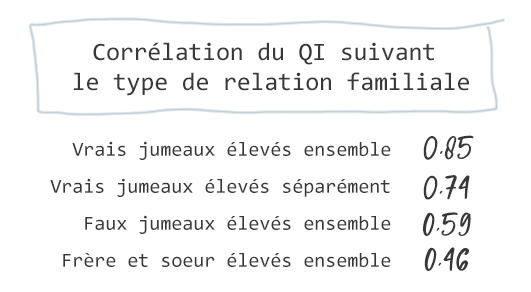
Facteurs environnementaux
Il y a encore bien trop peu de recherches sur le sujet. Néanmoins les pesticides et perturbateurs endocriniens ont l’air d’avoir un effet négatif sur nos quotients intellectuels.
Le QI est-il génétique ?
Il semblerait. Les QI des parents semblent avoir une influence sur le QI de l’enfant. Néanmoins, le consensus scientifique ne dispose à ce jour d’assez de preuve pour l’affirmer complètement. De plus, certains autres facteurs (biologiques, génétiques et environnementaux) semblent également avoir leur importance. Dans tous les cas, le score de QI des parents ne permet pas de définir avec certitude le QI de l’enfant, ou même une fourchette prédictive.
La taille du cerveau a-t-elle son importance avec le QI ?
Oui. Ou du moins, on le pense. En fait, il semblerait que ce soit principalement le volume de matière grise qui joue un rôle important sur le QI (et non pas le cerveau tout entier).
Comment augmenter son QI ?
On ne sait pas. L’influence du monde extérieur sur notre quotient intellectuel est encore mystérieuse. Néanmoins, il y a fort à parier qu’un mode de vie sain ne peut qu’y faire du bien.
Facteurs influencés par le QI
Il semble que nos personnalités soient partiellement influencées par notre QI. Les individus avec un quotient intellectuel plutôt faible ont des personnalités globalement identiques. Ce n’est pas le cas chez les personnes à quotients intellectuels élevés : leurs personnalités sont plus variées. Je m’explique : il y a plus de différence entre des personnes qui ont des QI de 140 et 160 que deux personnes avec des QI de 100 et 120. On peut imaginer que les hauts QI sont donc plus sensibles à leur environnement dans la création de leur personnalité. Cela rejoint les caractéristiques hypersensibles des zèbres, surdoués et autres hauts potentiels intellectuels. En effet, l’hypersensibilité et le potentiel émotionnel sont des caractéristiques importantes des personnes à haut potentiel avec une forte maturité intellectuelle.
Les tests de QI
J’ai abordé rapidement les différents tests existants pour mesurer le quotient intellectuel. Dans cette partie, je vais aller un peu plus en profondeur sur le sujet ainsi que sur l’interprétation des résultats. Sachez qu’il est également possible de tester son haut potentiel via l’approche clinique.
Je me permets également de faire une petite aparté sur le lien entre l’école et le quotient intellectuel. Tester le potentiel d’un (potentiel) adolescent ou enfant précoce arrive généralement dans deux situations. (1) La première est lorsque les élèves précoces sont en situation d’échec scolaire. À cause de leur fonctionnement cognitif différent, les enfants à haut potentiel ressentent de l’ennui à l’école – le système scolaire n’est pas fait pour eux. Ou alors, ils présentent différents troubles dys (dyslexie, dyspraxie, etc.), un TDAH (Trouble de Déficit de l’Attention / Hyper-activité), ou un fort décalage avec les autres. (2) La seconde est lorsque le fonctionnement intellectuel arrive à se faire à la société actuelle, et l’enfant surdoué fait preuve d’une réussite scolaire incroyable (avec saut de classe). Dans tous les cas, faire un bilan psychologique qui permettra de poser le bon diagnostique me semble prioritaire afin de déceler le potentiel.
Pourquoi passer un test de QI ?
Ça dépend. Il n’y a pas de raison précise, cela dépend de chacun. Certains peuvent avoir envie de satisfaire un besoin de curiosité, alors que pour d’autres il s’agit de « vérifier » la potentielle présence d’un haut potentiel intellectuel par exemple. Dans tous les cas, si vous avez un doutes sur un potentiel enfant intellectuellement précoce, foncez car comprendre le potentiel va l’aider à s’épanouir en devenant un adulte surdoué.
Puis-je trouver un test de quotient intellectuel gratuit ?
Oui, mais non. Cherchez sur internet et vous trouverez une multitude de tests de QI gratuits. Néanmoins, un « vrai » test de QI doit-être fait par un psychologue diplômé. Donc oui vous pourrez trouver un test de quotient intellectuel gratuit sur internet, mais il ne vous donnera pas un résultat valable.
Combien coûte un test de QI ?
Au moins 200€, voire plus. C’est pourquoi il est important d’être certain(e) de ses motivations avant de s’y lancer.
Comprendre les différents tests
Il existe de nombreux tests de QI différents. Néanmoins, les plus connus sont :
- Les tests de Wechsler (WAIS et WISC). Ce sont des tests de QI par rang avec une moyenne à 100 et un écart-type de 15 ;
- Le test de Cattell : également un test de quotient intellectuel par rang, mais avec une moyenne de 100 et un écart-type de 24.
Vous ne pouvez le passer qu’auprès d’un psychologue diplômé et si possible spécialisé dans la passation de test de QI. Et attention, ça coûte cher (comptez facilement 2-300€).
Composition d’un test de QI
Un test de quotient intellectuel est généralement composé de plusieurs sous-tests (appelés subtests). Chaque subtest est orienté autour d’un axe particulier. On peut par exemple retrouver :
- Des subtests liés à la performance pour tester la mémoire ou l’aptitude à la construction. Typiquement, on peut vous demander de retenir puis restituer un maximum de chiffres d’une suite, ou alors de construire une sorte de puzzle, ou reconstituer une image avec des cubes, etc.
- Des subtests logiques : trouver le prochain chiffre d’une suite de chiffres (a priori sans suite logique).
- Des subtests verbaux liés autour du langage, comme par exemple trouver le mot qui n’a pas sa place parmi d’autres.
Le test global peut se dérouler en une seule séance ou plusieurs. Il n’y a pas vraiment de règle. Par la suite, c’est au psychologue d’apprécier vos résultats et de vous donner votre score. Si vous obtenez un score sensiblement identique aux différents tests, on parlera de résultats homogènes. S’ils ne sont pas identiques, vous aurez des résultats hétérogènes. On parle également d’intelligences laminaires ou complexes.
Limites d’un test de QI
Les limites de ces tests sont (selon moi) très nombreuses. Tout d’abord, je les trouve trop liés à l’état dans lequel on se trouve lorsqu’on le passe. Avec du stress ou de la fatigue, il est fort probable que vous soyez plus en difficulté que si vous étiez en pleine forme. Second point, certaines catégories sont difficilement notables et le(la) psychologue qui vous fait passer le test peut donc faire varier votre résultat. Enfin, la barrière de la langue peut être un frein énorme pour les personnes qui le passent dans une langue qui n’est pas leur langue maternelle. À ce propos d’ailleurs, le test de Cattell ne fait pas passer de subtest verbal afin de limiter cet effet de biais linguistique. On dit qu’il est aculturel.
Interpréter les résultats d’un test de quotient intellectuel
On vient de voir que le test de QI a plusieurs limites – trop selon moi. Ainsi, le résultat global est à prendre avec des pincettes. Je préconise plutôt d’étudier le résultat de chaque subtest et d’en discuter avec la personne qui vous les a fait passer (et de faire attention à la classification du QI). C’est elle qui sera la plus à-même de vous faire un compte rendu précis, et non ce que vous pouvez tirer d’un score inscrit sur un bout de papier. N’oubliez pas non plus que, si vous repassez le test, il est probable que vous n’obteniez pas le même résultat. C’est normal, vous l’aurez fait dans des conditions différentes. De plus, on estime que le résultat obtenu ne correspond qu’à 70% de votre « intelligence réelle ».
C’est pour toutes ces raisons que j’ai choisi de ne pas parler de mon score de QI. Je ne pense pas qu’il influe sur la douance qui est, à mon avis, plutôt basée sur un ressenti que sur un chiffre variable. Malgré ce, je comprends parfaitement le besoin de certains d’aller mettre un nombre sur ce qu’ils ressentent. Ça fait toujours du bien. Je mets juste en exergue le fait que ce nombre a une variabilité que je juge trop importante pour être pris au sérieux – même si, je vous l’accorde, il peut donner une véritable tendance.
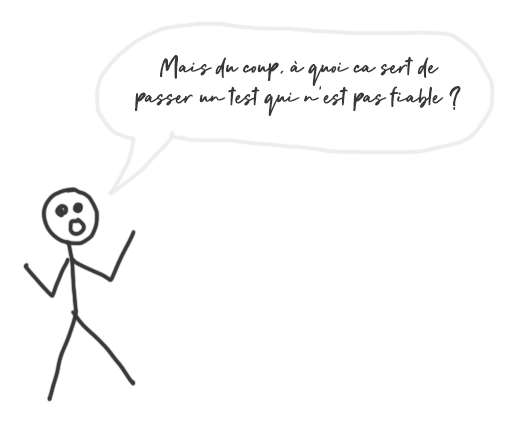
C’est quoi un QI élevé ?
130. On considère généralement que les hauts potentiels intellectuels doivent avoir un quotient intellectuel supérieur à 130 (sur l’échelle de Wechsler).
Quel est le QI moyen d’une personne ?
100. On considère (arbitrairement) que le QI moyen d’une personne est de 100 sur l’échelle de Wechsler. Mais il ne s’agit là que d’un consensus scientifique.
Quel est le QI d’un surdoué ?
130 et plus. On considère généralement que les surdoués, précoces ou hauts potentiels doivent avoir un quotient intellectuel supérieur à 130 (sur l’échelle de Wechsler).
Comment évolue le QI avec l’âge ?
Il baisse, ou du moins c’est ce que l’on pense pour le moment.
Quel est le QI d’un autiste Asperger ?
70. Pour qu’un individu soit diagnostiqué Autiste de Haut Niveau ou comme ayant le syndrome d’Asperger, il faut que son quotient intellectuel soit supérieur à 70 sur l’échelle de Wechsler (en plus des autres critères habituels d’un diagnostic d’autisme).
Les limites et critiques autour du QI
Même si l’idée de mesurer l’intelligence semble, pourquoi pas, être une bonne chose, le quotient intellectuel est régulièrement vivement critiqué. En voici les principales causes.
Absence de définition globale et commune de l’intelligence
Tout d’abord, les scientifiques n’arrivent pas à s’accorder sur une définition de l’intelligence. Et si on ne sait pas ce que l’on doit mesurer, vous conviendrez qu’il peut être difficile de le mesurer. En fait, cette absence de définition vient du fait que l’intelligence reste un gros sujet de débat sur le plan scientifique. Beaucoup de questions majeures ne sont pas résolues.

Biais culturel
Ce point peut être défini en deux sous-parties. Tout d’abord, un biais culturel existe quant à la définition même de l’intelligence (et qui participe à l’absence d’un consensus scientifique, comme évoqué ci-dessus). Selon l’endroit où nous nous trouvons dans le monde (donc selon la culture du pays), l’intelligence n’aura ni la même valeur ni la même définition. Doit-on du coup mesurer l’intelligence selon les critères de ceux qui ont créé les échelles de QI ?
Ensuite, et je l’ai évoqué précédemment, un biais culturel a lieu notamment lors des subtests verbaux présents dans certains tests de QI verbal. Si vous passez le test de quotient intellectuel dans un pays où l’on ne parle pas votre langue maternelle, vous pouvez effectivement être défavorisé (sans pour autant que cela n’impacte votre niveau réel d’intelligence). Vous ne parlez juste pas bien la langue. Je suis sûr que je n’obtiendrai pas les mêmes résultats si je repassais le même test de QI en Espagne que celui que j’avais fait en France. Pourtant, je reste tout aussi intelligent. Pour limiter ces effets, le test de Cattell ne propose pas de subtest verbal – il est aculturel.

Problèmes soulevés par les échelles : variance et hauts scores
Les échelles de QI sont également limitées. Déjà, on observe une variance difficilement justifiable entre plusieurs tests. Si vous passez deux fois le même test, il est possible que vous n’obteniez pas les mêmes résultats. Cela peut être dû à la présence ou non de stress, de fatigue, d’entente avec le(la) psychologue, l’appréciation de ce même psychologue, etc. Et ça, scientifiquement, c’est pas top. Autre problème : la précision de l’échelle lorsque l’on arrive sur des hauts QI peut être améliorée.
Le mythe de l’Effet Flynn
James Flynn est un Américain. Il a constaté l’augmentation globale (à l’échelle mondiale) des scores de QI tout au long du 20ème siècle, jusqu’au début des années 1990s. Cet accroissement s’appelle l’Effet Flynn. En cherchant à comprendre pourquoi les années 90s marquent la fin de la croissance cognitive, les chercheurs ont émis plusieurs possibilités :
- Changement des modèles d’alimentation avec la globalisation ;
- Influence de nouveaux stimuli depuis un jeune âge (notamment les écrans de télévision puis ordinateurs et smartphones) ;
- Corrélation avec l’accroissement de la durée de vie.
La raison est en fait toute autre : l’Effet Flynn n’a jamais réellement été validé, et les quotients intellectuels de notre planète n’ont cessé de baissé. Flynn ne se serait intéressé qu’aux quotients intellectuels les plus faibles (qui eux ont bel et bien augmenté grâce à l’amélioration des conditions de vie). Cependant, la moyenne générale, elle, a baissé. De plus, les échelles de QI ont été régulièrement mises à jour, faussant les études globales sur plusieurs décennies.

Pourquoi le QI diminue ?
On ne sait pas vraiment. Cependant, il semblerait que l’influence de nouveaux stimuli (les écrans notamment) sur des cerveaux jeunes et en formation ainsi que les contacts plus répétés avec certains produits chimiques et perturbateurs endocriniens n’y soient pas pour rien.
Comment évolue le QI lors d’une dépression ?
Il baisse. Il semblerait que le QI baisse lors d’une dépression. Cette baisse est encore plus important en cas de troubles bipolaires.
Est-ce que le QI est fiable ?
Pas vraiment. Les résultats peuvent varier en fonction de nombreux éléments (fatigue, stress, psychologue, biais culturel, etc.) sans que votre intelligence ne reste changée. De plus, les scientifiques ne sont à ce jour pas d’accord sur une définition précise de l’intelligence. Difficile de mesurer quelque chose que l’on ne comprend pas encore bien.
QI moyen
Enfin, nous débutons la dernière partie de cet article (et celle que je trouve la plus drôle) autour du QI moyen. L’idée de cette étude est de regarder l’impact que ce quotient intellectuel peut potentiellement avoir sur une population, une profession ou un pays – et non d’en tirer des conclusions hasardeuses. Les moyennes de quotients intellectuels doivent donc être prises avec des pincettes.
Les moyennes par pays et professions
Tout d’abord, nous allons parler du QI moyen par pays. Sachez que, en France, nous avons un QI moyen de 98. Ce n’est pas trop mal, car il semblerait que la moyenne par pays soit comprise entre 84 et 88. Les grands gagnants se trouvent en Asie de l’Est : Hong Kong (107), Corée du Sud (106), Japon (105), et Taiwan (104). Vous remarquerez que j’ai dit le QI moyen par pays est entre 84 et 88. Alors pourquoi pas 100, comme indiqué sur la courbe du QI plus tôt ? Tout simplement parce qu’il s’agit ici d’une moyenne des pays, et non du nombre d’habitants. Par exemple, les Chinois ont un QI moyen de 100 et (vu qu’ils sont beaucoup) vont considérablement faire augmenter la moyenne si on prenait une moyenne par habitants.
Prenons maintenant quelques moyennes de QI par profession. Aux États-Unis, le médecin moyen a 114, le dentiste 108, le physiothérapeute 111, et un diététicien 91.
Quel est le QI moyen des français ?
98. Le quotient intellectuel moyen des français est de 98 sur l’échelle de Wechsler.
Pourquoi le QI des français régresse ?
On ne sait pas vraiment. Néanmoins, il est possible que cela soit pour les mêmes raisons que la baisse des QI du monde entier : trop d’écrans et de produits chimiques dans notre vie quotidienne.
Quel est le QI moyen du Japon ?
105. Les japonais, souvent pris en exemple, ont un QI moyen de 105 sur l’échelle de Wechsler.
Les records
Quelques records maintenant. Attention par contre, les tests ont été réalisés avec l’échelle de Cattell (et non l’échelle de Wechsler). Ainsi, les résultats obtenus sont plus impressionnants. The best of the best semble être le mathématicien australien Terence Tao avec un QI de 230 (prêt de 180 chez Wechsler). Il est suivi par Kim Ung-Yong avec un quotient intellectuel de 210 (ce qui ferait environ 160 avec Wechsler). Il a même été embauché par la NASA à ses neuf ans ! Normal.
Pour ce qui est du QI le plus faible, c’est très dur à dire. En effet, ils ne sont généralement pas mesurés et je ne trouve donc aucune archive à ce sujet. Sorry.
Qui a le QI le plus élevé du monde ?
Terence Tao. Il s’agit du mathématicien australien Terence Tao qui culmine à 230 sur l’échelle de Cattell, soit environ 180 sur l’échelle de Wechsler.
Qui a le QI le plus bas du monde ?
On ne sait pas, car personne ne se précipite pour se faire tester en cas de suspicion de QI trop faible.
Qui a un QI de plus de 200 ?
Peu de monde. En effet, les quotients intellectuels si élevés sont très rares. Après, tout dépend de l’échelle dans laquelle on les mesure.
Les QI des stars
Parlons maintenant de nos petites célébrités. Visiblement, tout le monde explique avoir un score (très) élevé. On pourrait donc légitimement se poser quelques questions. (1) Est-ce que tous les quotients intellectuels sont sur la même échelle ? Probablement que non, vu que certains hauts scores ne semblent pas faisables chez Wechsler. Mais même en les mettant sur l’échelle de Cattell (ce qui est probable avec des anglo-saxons), ces résultats sont incroyables. Alors (2) est-ce que tous les personnages publics sont des surdoués ou (3) alors se moquent-ils tous de nous ?
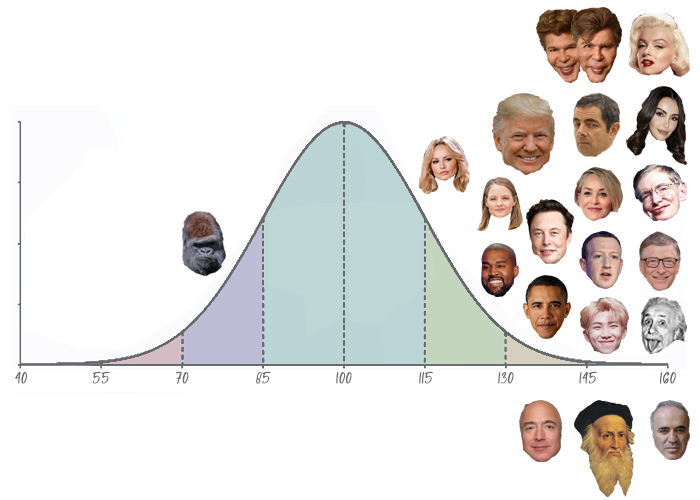
Quel était le QI d’Albert Einstein ?
160. On estime que Albert Einstein avait un quotient intellectuel d’environ 160, mais il ne s’agit là que d’une estimation.
Quel était le QI de Stephen Hawking ?
160. Comme pour Einstein, on estime que Stephen Hawking avait un quotient intellectuel d’environ 160, mais il ne s’agit là que d’une estimation.
Quel est le QI d’Adriana Karembeu ?
120. Lors d’une émission télévisée sur France 2, Miss Karembeu a réalisé un test de quotient intellectuel et a appris qu’elle était en fait dans le haut de la fourchette : à 120.
Quel est le QI de Bill Gates ?
160. Bill Gates, le fondateur de Microsoft et une des plus grosses fortunes mondiales aurait un quotient intellectuel de 160.
Quel est le QI des frères Bogdanov ?
190. Ils ont déclaré avoir passé un test de QI à 11 ans et faire partie des 0,01% de la population avec un very high IQ supérieur à 190.
Quel est le QI de Elon Musk ?
Beaucoup, c’est du moins ce que certains semblent estimer.
Quel est le QI de Jodie Foster ?
132. C’est d’ailleurs ce qui lui vaut sa réputation (plus que méritée) d’actrice surdouée.
Quel est le QI de Jeff Bezos ?
Hors du commun. Il n’a jamais dévoilé le résultat, mais il semblerait que, lorsqu’il a été testé à l’âge de 8 ans, le résultat ait été « hors du commun ». Mystère donc.
Quel est le QI de Garry Kasparov ?
190. Champion incontesté d’échecs, Kasparov aurait un quotient intellectuel hors norme de 190.
Quel est le QI de Kanye West ?
132. Kanye West a déclaré, lors d’une récente conférence dans le cadre de sa candidature aux élections présidentielles américaines, avoir un QI de 132, ce qui ferait de lui un « génie » tout en rendant sa vie compliquée car son « cerveau est trop gros pour son crâne » et il a dû aller à l’hôpital.
Quel est le QI de Kim Namjoon ?
148. L’artiste sud-coréen aurait en effet un QI de 148, soit bien supérieur à la moyenne.
Quel est le QI de Koko le Gorille ?
70-95. Koko, la célèbre gorille qui parlait le langage des signes, avait un QI compris entre 70 et 95 (soit potentiellement plus qu’une grande partie de l’humanité, rien que ça).
Quel est le QI de Léonard de Vinci ?
220. Certains ont déduit que Léonard de Vinci devait avoir un quotient intellectuel de 220.
Quel est le QI de Marilyn Monroe ?
165. Son QI était d’ailleurs plus élevé que celui d’Einstein. Pas étonnant qu’elle ait terminé par faire des sauts à la Maison Blanche !
Quel est le QI de Nabilla ?
160. On l’a trouvée, notre nouvelle Einstein. Blague à part, c’est une business woman incroyable.
Quel est le QI de Barack Obama ?
137. Le chiffre ne semble pas officiel, mais plusieurs sources relatent un QI très élevé. Yes he can have an IQ of 137.
Quel est le QI de Rowan Atkinson ?
173. Mister Bean n’est en réalité pas si simplet, car Rowan Atkinson aurait un quotient intellectuel de 173.
Quel est le QI de Sharon Stone ?
154. Encore une preuve qu’incarner des personnages peu ingénieux ne veut pas dire que l’on ne peut pas avoir être surdouée.
Quel est le QI de Donald Trump ?
« L’un des meilleurs et vous le savez tous ». Dans la suite de son Tweet, il nous recommande d’ailleurs de ne pas nous « sentir stupides ou peu sûrs de nous-mêmes » car « ce n’est pas notre faute ». Un génie.
Quel est le QI de Uma Thurman ?
183. Là, elle n’est pas qu’un peu surdouée ! Kill Bill en a aussi sous sa chevelure blonde.
Quel est le QI de Mark Zuckerberg ?
152. C’est en tout cas la plus récente estimation.
Conclusion
Pour conclure, le Quotient Intellectuel (QI) permet de mesurer l’intelligence via la mesure du Facteur g. Ce n’est donc pas une mesure précise, car elle ne mesure pas l’objet directement mais plutôt quelque chose en corrélation. Dans l’idée, c’est comme si vous deviez mesurer votre taille en fonction de votre ombre. De plus, l’absence de consensus scientifique quant à la définition de l’intelligence ainsi que les différents biais et variables pouvant arriver lors d’un test de quotient intellectuel font qu’il ne s’agit là que d’une mesure approximative. Il peut par contre donner une tendance, mais pas une mesure définitive.
Un QI élevé est normalement l’unique porte d’entrée vers le haut potentiel intellectuel. Néanmoins, à cause de toutes ces variables et imprécisions, je pense que la douance devrait se ressentir plutôt que se mesurer.
Sources
- Alliger R., Andreasen N., Cohen G., Ehrhardt J., Flaum M., O’Leary D., Swayze V., Yuh W., (American Journal of Psychiatry), Intelligence and brain structure in normal individuals, 1993.
- Amino N., Ide A., (Lancet Diabetes & Endocrinology), Maternal thyroid function and child IQ, 2016.
- Ankney C., Rushton J., (International Journal of Neuroscience), Whole Brain Size and General Mental Ability: A Review, 2009.
- Boodoo G., Bouchard T., Boykin W., Brody N., Ceci S., Halpern D., Loehlin J., Neisser U., Perloff R., Sternberg R., Urbina S., (American Psychologist), Intelligence: Knowns and unknowns, 1996.
- Boomsma D., Dolan C., Hessen D., Oosterveld P., Span M., van Baal C., Wicherts J., (Intelligence), Are intelligence tests measurement invariant over time? Investigating the nature of the Flynn effect, 2004.
- Boomsma D., Brouwer R., Hulshoff E., Kahn R., Peper J., Pol H., van den Berg S., van Leeuween M., (Intelligence), A genetic analysis of brain Vols. and IQ in children, 2009.
- Bouchard T., McGue M., (Science), Familial Studies of Intelligence: A Review, 1981.
- Daniels M., Devlin B., Roeder K., (Nature), The heritability of IQ, 1997.
- Ellis C., Josse G., Price C., Ramsden S., Richardson F., Seghier M., Shakeshaft C., Thomas M., (Nature), Verbal and non-verbal intelligence changes in the teenage brain, 2011.
- Chaker L., Jaddoe V., Korevaar T., Medici M., Muetzel R., Medici M., Peeters R., Rijke Y., Steegers E., Tiemeier H., Visser T., White T., (Lancet Diabetes & Endocrinology), Association of maternal thyroid function during early pregnancy with offspring IQ and brain morphology in childhood: a population-based prospective cohort study, 2015.
- Deary I., Intelligence: a very short introduction, 2001.
- Deary I., (Current Biology), Intelligence, 2013.
- Deary I., Stough C., (American Psychologist), Intelligence and inspection time: Achievements, prospects, and problems, 1996.
- Horel S., (Le Monde), Chlorpyrifos : les dangers ignorés d’un pesticide toxique, 2019.
- Lally M., Nettelbeck T., (British Journal of Psychology), Inspection time and measured intelligence, 1976.
- McDaniel, M., (Intelligence), Big-Brained People are Smarter: A Meta-Analysis of the Relationship between In Vivo Brain Volume and Intelligence, 2005.
- Miele, F. (Westview Press), Intelligence, race, and genetics: Conversations with Arthur R. Jensen, 2002.
- Rosier F., (Le Monde), Science 09/07/14 Dossier Jumeaux Leader, 2014.
- Van de Vijver F., (Journal of Cross-Cultural Psychology), Meta-Analysis of Cross-Cultural Comparisons of Cognitive Test Performance, 1997.
